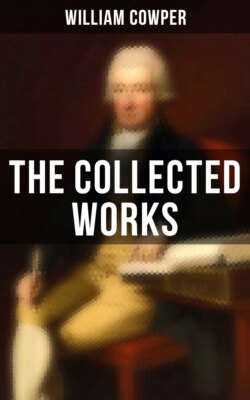Читать книгу The Collected Works - William Cowper - Страница 240
На сайте Литреса книга снята с продажи.
TO THE REV. JOHN NEWTON.
ОглавлениеTable of Contents
Olney, Oct. 13, 1783.
My dear Friend—I am much obliged to you for your American anecdotes, and feel the obligation perhaps more sensibly, the labour of transcribing being in particular that to which I myself have the greatest aversion. The loyalists are much to be pitied: driven from all the comforts that depend upon, and are intimately connected with, a residence in their native land, and sent to cultivate a distant one, without the means of doing it, abandoned too through a deplorable necessity, by the government to which they sacrificed all,[202] they exhibit a spectacle of distress, which one cannot view, even at this distance, without participating in what they feel. Why could not some of our useless wastes and forests have been allotted to their support? To have built them houses indeed, and furnished them with implements of husbandry, would have put us to no small expense; but I suppose the increase of population and the improvement of the soil would soon have been felt as a national advantage, and have indemnified the state if not enriched it. We are bountiful to foreigners, and neglect those of our own household. I remember that, compassionating the miseries of the Portuguese, at the time of the Lisbon earthquake,[203] we sent them a ship-load of tools to clear away the rubbish with, and to assist them in rebuilding the city. I remember too it was reported at the time that the court of Portugal accepted our wheelbarrows and spades with a very ill grace, and treated our bounty with contempt. An act like this in behalf of our brethren, carried only a little farther, might possibly have redeemed them from ruin, have resulted in emolument to ourselves, have been received with joy, and repaid with gratitude. Such are my speculations upon the subject, who, not being a politician by profession, and very seldom giving my attention for a moment to such a matter, may not be aware of difficulties and objections, which they of the cabinet can discern with half an eye. Perhaps to have taken under our protection a race of men proscribed by the Congress, might be thought dangerous to the interests we hope to have hereafter in their high and mighty regards and affections. It is ever the way of those who rule the earth, to leave out of their reckoning Him who rules the universe. They forget that the poor have a friend more powerful to avenge than they can be to oppress, and that treachery and perfidy must therefore prove bad policy in the end. The Americans themselves appear to me to be in a situation little less pitiable than that of the deserted loyalists. Their fears of arbitrary imposition were certainly well founded. A struggle therefore might be necessary, in order to prevent it, and this end might surely have been answered without a renunciation of dependence. But the passions of a whole people, once put in motion, are not soon quieted. Contests beget aversion, a little success inspires more ambitious hopes, and thus a slight quarrel terminates at last in a breach never to be healed, and perhaps in the ruin of both parties. It does not seem likely that a country so distinguished by the Creator with every thing that can make it desirable should be given up to desolation for ever; and they possibly have reason on their side, who suppose that in time it will have the pre-eminence over all others; but the day of such prosperity seems far distant—Omnipotence indeed can hasten it, and it may dawn when it is least expected. But we govern ourselves in all our reasonings by present appearances. Persons at least no better informed than myself are constrained to do so.
I intended to have taken another subject when I began, and I wish I had. No man living is less qualified to settle nations than I am; but, when I write to you, I talk, that is I write as fast as my pen can run, and on this occasion it ran away with me. I acknowledge myself in your debt for your last favour, but cannot pay you now, unless you will accept as payment, what I know you value more than all I can say beside, the most unfeigned assurances of my affection for you and yours.
Yours, &c.
W. C.
